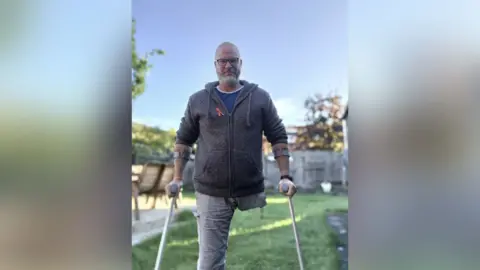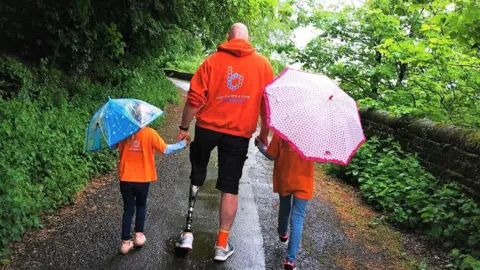'Leg amputation gave me my life back'
 Supplied
SuppliedA man who had his left leg amputated after surviving cancer has shared how the procedure helped improve his mental health.
Pete Lloyd, 42, from Glossop in Derbyshire, is about to take on a festive 5km run for charity after being diagnosed with osteosarcoma, the most common form of primary bone cancer found in children and young adults, in 2011.
The cancer treatment meant he had to have his hip bone socket replaced but as he was left unable to play with his children, he decided to have his leg amputated.
Mr Lloyd said: "I was living painkiller to painkiller... the surgery that disabled me the most, was also the best for my mental health."
After his diagnosis, doctors told the father of three he would have a 20% chance of survival without chemotherapy, which would increase to 60% with treatment.
A week later, Mr Lloyd was fitted with a Hickman line and placed on a chemotherapy protocol, followed by a hip bone socket replacement.
 Supplied
SuppliedBut after being left unable to play with his children, Mr Lloyd made the decision to amputate his leg from the hip in 2017.
"I was in constant pain, it made me on edge, I was anxious and I was getting depressed," he said.
"We didn't do anything for so long until my amputation and, since then, I've got my life back.
"It has been a long recovery from chemotherapy. My memory is still affected from the treatment, and I've had 10 operations in total, but at least I can now play with my three wonderful children on the floor or in the back garden."
Since his treatment, Mr Lloyd has made "huge strides" in his recovery and has thrown himself into new hobbies including wheelchair racing.
He has decided to give back to the Bone Cancer Research Trust, the charity that supports him, by completing their festive 5km challenge around Temple Newsam in Leeds.
He is racing on his crutches without his prosthetic leg and is aiming to take part in the Manchester Marathon in 2026.
"This [race] is about saying to people there is a life after cancer and that one day we'll be able to find a cure," he added.
Follow BBC Derby on Facebook, on X, or on Instagram. Send your story ideas to [email protected] or via WhatsApp on 0808 100 2210.
